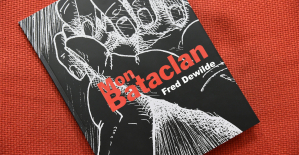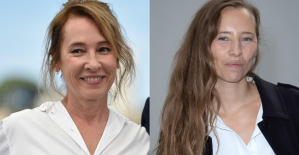the Karolinska university hospital's board of directors launched in the autumn, with a review to see how it criticized the new organization, known as the ”new operating model”, it works.
the Inquiry was appointed by the new board after the old board in may was replaced, then Today's News in a series of articles written about the big problems in the organization and to several key figures, including the former chairman of the board, had business interests around the hospital and its new model.
During Wednesday came a report, based on documents and interviews with a large number of employees, which establishes a number of serious shortcomings. Despite the hospital's new slogan ”the Patient first”, goes the actual priorities in the opposite direction.
" It is a serious criticism, says president Håkan Sörman.
DN told in several articles, the work began to develop the new operating model in 2015. It is based on the american vårdkonceptet value-based care, the Boston Consulting Group, promoted and sold to the Karolinska. The company had great influence in how the new organization was designed.
the Clinics, which was developed under a century in the similar way throughout the world, and are built around the doctors ' specialties, disappeared – and was replaced by the amounts of "flows", based on individual diagnoses. Now it would all be more effective. The patient would not have to visit a different devices, but the specialists would gather around the patient. An advanced it-system, with ”digital scorecard” would also be built up, to be able to follow up on the detail and provide better quality of care, and the economy. But the organization was introduced quickly without any economic impact assessment, and without having been tested against laws and regulations.
the reorganization was felt that the clinics were ”drainpipe”: units that did not cooperate, but most looked to their own best interest. Now lay the board's report, on the contrary, held that the operations become more fragmented with the large amount of flows, with its own budget and human resources. ”Stuprören” has increased, something that the heads enter as a significant problem.
"we feel that these flows which are quite numerous, and that is the heart of the organization - that they do not interact in a good way," says Sörman, who want the number of flows will now be reviewed, as well as jourlinjerna that has become expensive and the specialties, which in some cases split up in several themes.
Who is responsible for making decisions has also become unclear. It is unclear how to share the resources which will be common, as jourlinjer, shared vårdgolv and specialist skills that will be sought from the respective flow.
that the decision would be made closer to the patient. the , It has instead become, on the contrary, the report shows: the trend goes towards a greater centralization of decisions, especially in economic matters. ”Significantly many” employees consider themselves to have gotten worse influence over the work. Many describe a feeling of powerlessness and resignation.
in The past the principals, who had the mandate to make decisions and at the same time were medically responsible, has been removed and replaced by "operational managers" without medical expertise, ”patientområdeschefer” and ”patientflödesansvariga”, with a less clear mandate. Many employees are asking for a clearer governance and want back the principals. The opportunity to take a more comprehensive prioriteringsbeslut has decreased.
According to the health and medical services act has been the department head of the medical responsibility as well as a responsible. Now it is unclear who has the responsibility.
" I dare not comment on it. From the side assessed to patientområdeschefen is the equivalent of the manager in the eyes of the law. The question is whether it is sufficiently clear when it comes to the work environment, " says Håkan Sörman.
The increase in the number of organizational units, flows, is considered to be cost drivers. And managers state that the governance of the it system – which led to a significantly increased administrative work – is so inadequate that they no longer have the opportunity to follow up the operation, neither on the quality of care, and the economy.
located in the so-called master data followed the previous clinics. Master data consists of the placement of the information and cost centres in the it system, for everything from medical records to exception reports, human resource management, and economic systems in the vårdorganisationen. It consists at the Karolinska 250 different systems that must interact in order to be able to control the economy and businesses. The transition to the new operating model was made without it-the support had been tailored. Therefore is no longer true masterdatan and the information to flödescheferna in the activities - and the hospital can not be controlled as intended in the value-based care. DN has previously told you that the economy because of this is unable to control. Karolinska is moving toward a gigantic deficit.
" this is absolutely fundamental for the business to get the order in. When the information is not sufficient, it is not possible to keep track of either finance or operations. It should be ready by October 1, but it must be speeded up. I think that is the reason why many people feel that the organisation has become more centralised. If you do not have access to the right information so must the cases be sent up, and it was not really supposed, " says Håkan Sörman.
for some distinct groups of patients resulted in improvements, but for others – such as co-morbidity in patients with several different diagnoses, which is common among the elderly, the new organization given the ”particular problem”. Co-morbidity has fallen between the cracks, since they are often not able to be placed in the right flow.
Because the patientflödena is narrower, it is also more difficult for the staff in the emergency department to directly pick out the right patient flow to place patients in. ”Patients with mångsjuklighet will be particularly at risk when there is vårdplatsbrist”. Patients are moved around too often can have adverse effects on patient safety, according to the report.
Björn Zoëga takes over as the new director. In an interview with DN, declared that he was critical of the fundamental parts of the concept of value-based care, and opened up for changes in the new organization. He was not entirely averse to take back the clinics.
the Issues raised about the organisation need to be addressed now, says the chairman of the board Håkan Sörman. To take back the clinics is, however, nothing that the board proposes at the present time.
– To go back to the klinikorganisationen, it can simply do not - it is a jätteförändring again.
on competent staff and beds aggravate the situation, turn the board fixed.
How to cope to educate the doctors are a concern, when the New Karolinska become so highly specialized that they find it difficult to meet the ”ordinary patients”, which to a greater extent, reference is made to primary health care and private health care providers in the vårdvalen. With the increasing competition for health care needs, it is also more difficult to find doctors who can devote time as a supervisor – as well as time to clinical research.
the Confidence in the hospital management among the employees is low, the lowest among doctors. The lack of confidence to be linked to the new operating model, and despite the fact that the hospital suspended the cooperation with the Boston Consulting Group, considered the governance of the hospital ”still too much characterised by konsultidéer”.
master kai fa was asked to do a review of the organisation, to clarify who has responsibility at different levels. The director shall also assess the hospital's compliance with the law when the principals have been removed. Based on the review, proposals for changes of the model are presented. Acting master kai fa Annika Tibell was commissioned by the board of directors already on 8 January.
DN asked Tibell in October if she felt that the organization was ready when it was introduced.
" It was a new model, but the basic structure was of course finished. We need to fine tune a little bit, " she said then.
in Parallel with the sjukhusstyrelsens the work of the working group at the hospital to get the new organisation to work better. The group has come to the same conclusions as the board of directors, Håkan Sörman lift the positive for a change to happen.
Annika Tibell, but Karolinskas the press refers to her comment in a press release, in which she welcomes the fact that the operational model is monitored.
– To further develop and adjust our model must now be done in close collaboration with our clinical colleagues. This is together with the economy in our most important areas of improvement for the years 2019, " says Annika Tibell in the press release.
Oppositionsregionrådet Erika Ullberg (S):
" The massive criticism of the new konsultdrivna and previously untested operating model was demonstrably justified. I now have the hope and expectation that the new master kai fa and the rest of the lead professional makes all of the changes that are needed to retain skills, clarify patientansvar and reduce costs.
the DN has previously revealed major shortcomings in the management of the consultants and invoices from the BCG at the Karolinska, which led to a series of consequences, among other things, new procedures and that the hospital's senior vice president and upphandlingschef stopped, both after stated a conflict of interest.

 In Germany, the far left wants to cap the price of “doner kebabs”
In Germany, the far left wants to cap the price of “doner kebabs” Israel-Hamas war: Gaza between hope of truce and fear of Israeli offensive in the South
Israel-Hamas war: Gaza between hope of truce and fear of Israeli offensive in the South “Mom, Dad, please don’t die”: in the United States, a nine-year-old child saves the lives of his parents injured in a tornado
“Mom, Dad, please don’t die”: in the United States, a nine-year-old child saves the lives of his parents injured in a tornado War in Ukraine: Putin orders nuclear exercises in response to Macron and “Western leaders”
War in Ukraine: Putin orders nuclear exercises in response to Macron and “Western leaders” A baby whose mother smoked during pregnancy will age more quickly
A baby whose mother smoked during pregnancy will age more quickly The euro zone economy grows in April at its best pace in almost a year but inflationary pressure increases
The euro zone economy grows in April at its best pace in almost a year but inflationary pressure increases Children born thanks to PMA do not have more cancers than others
Children born thanks to PMA do not have more cancers than others Breast cancer: less than one in two French women follow screening recommendations
Breast cancer: less than one in two French women follow screening recommendations Call for strike on Sunday at Radio France against “the repression of insolence and humor” after the suspension of Guillaume Meurice
Call for strike on Sunday at Radio France against “the repression of insolence and humor” after the suspension of Guillaume Meurice Disney: profitable streaming for the first time, after 5 years of losses
Disney: profitable streaming for the first time, after 5 years of losses “I’m going to four concerts... I spent 1,255 euros”: for Taylor Swift, these fans ready to break the bank
“I’m going to four concerts... I spent 1,255 euros”: for Taylor Swift, these fans ready to break the bank SNCF: the CEO defends the agreement on the end of career, “reasonable, balanced and useful”
SNCF: the CEO defends the agreement on the end of career, “reasonable, balanced and useful” A little something extra, signed Artus, exceeds one million entries in less than a week
A little something extra, signed Artus, exceeds one million entries in less than a week Fred Dewilde, designer and Bataclan survivor, ended his life
Fred Dewilde, designer and Bataclan survivor, ended his life “I don’t appreciate being used as media cannon fodder”: Emmanuelle Bercot responds to Isild Le Besco
“I don’t appreciate being used as media cannon fodder”: Emmanuelle Bercot responds to Isild Le Besco Who is Deborah de Robertis, the artist who painted The Origin of the World?
Who is Deborah de Robertis, the artist who painted The Origin of the World? Omoda 7, another Chinese car that could be manufactured in Spain
Omoda 7, another Chinese car that could be manufactured in Spain BYD chooses CA Auto Bank as financial partner in Spain
BYD chooses CA Auto Bank as financial partner in Spain Tesla and Baidu sign key agreement to boost development of autonomous driving
Tesla and Baidu sign key agreement to boost development of autonomous driving Skoda Kodiaq 2024: a 'beast' plug-in hybrid SUV
Skoda Kodiaq 2024: a 'beast' plug-in hybrid SUV The home mortgage firm rises 3.8% in February and the average interest moderates to 3.33%
The home mortgage firm rises 3.8% in February and the average interest moderates to 3.33% This is how housing prices have changed in Spain in the last decade
This is how housing prices have changed in Spain in the last decade The home mortgage firm drops 10% in January and interest soars to 3.46%
The home mortgage firm drops 10% in January and interest soars to 3.46% The jewel of the Rocío de Nagüeles urbanization: a dream villa in Marbella
The jewel of the Rocío de Nagüeles urbanization: a dream villa in Marbella Europeans: David Lisnard expresses his “essential and vital” support for François-Xavier Bellamy
Europeans: David Lisnard expresses his “essential and vital” support for François-Xavier Bellamy Facing Jordan Bardella, the popularity match turns to Gabriel Attal’s advantage
Facing Jordan Bardella, the popularity match turns to Gabriel Attal’s advantage Europeans: a senior official on the National Rally list
Europeans: a senior official on the National Rally list Blockade of Sciences Po: the right denounces a “drift”, the government charges the rebels
Blockade of Sciences Po: the right denounces a “drift”, the government charges the rebels These French cities that will boycott the World Cup in Qatar
These French cities that will boycott the World Cup in Qatar Mercato: Thiago Silva returns to Brazil and signs for Fluminense
Mercato: Thiago Silva returns to Brazil and signs for Fluminense Top 14: at what time and on which channel to follow the clash at the Toulouse-Stade Français summit?
Top 14: at what time and on which channel to follow the clash at the Toulouse-Stade Français summit? Tennis: Paula Badosa, former world No.2, passes the 1st round in Rome
Tennis: Paula Badosa, former world No.2, passes the 1st round in Rome Tour of Italy: Italian Jonathan Milan wins the 4th stage, Pogacar still leader
Tour of Italy: Italian Jonathan Milan wins the 4th stage, Pogacar still leader


















